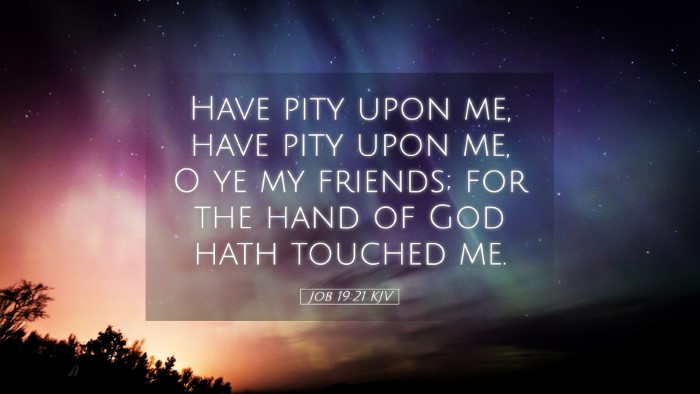Old Testament
Genesis Exodus Leviticus Numbers Deuteronomy Joshua Judges Ruth 1 Samuel 2 Samuel 1 Kings 2 Kings 1 Chronicles 2 Chronicles Ezra Nehemiah Esther Job Psalms Proverbs Ecclesiastes Song of Solomon Isaiah Jeremiah Lamentations Ezekiel Daniel Hosea Joel Amos Obadiah Jonah Micah Nahum Habakkuk Zephaniah Haggai Zechariah MalachiJob 19:21
Job 19:21 KJV
Have pity upon me, have pity upon me, O ye my friends; for the hand of God hath touched me.
Job 19:21 Bible Commentary
Commentary on Job 19:21
Bible Verse: Job 19:21 - "Have pity upon me, have pity upon me, O ye my friends; for the hand of God hath touched me."
Introduction
In this poignant verse, Job expresses a profound plea for compassion from his friends amidst his immense suffering. This excerpt encapsulates the themes of human suffering, divine sovereignty, and the search for empathy, which are richly explored throughout the Book of Job. Below we explore insights from revered public domain commentaries to provide a comprehensive understanding of this significant passage.
Matthew Henry's Commentary
Matthew Henry emphasizes the emotional turmoil that Job experiences in this moment. He points out that Job's desperate call for pity reflects not just his physical agony, but also the overwhelming loneliness that accompanies his trials. Henry notes:
- Human Suffering: Job acknowledges the reality of his suffering and the need for sympathy from those around him. Henry remarks that the faithful must extend compassion to the suffering, reminding us of our responsibilities to one another.
- Divine Touch: The phrase "the hand of God hath touched me" indicates Job's understanding of divine agency in his afflictions. Henry suggests that while God is sovereign over suffering, so too is He present within it, inviting faith and reliance on Him even during the darkest times.
Albert Barnes' Commentary
Albert Barnes expands upon the implications of Job's request for pity, focusing on the relational dynamics between Job and his friends. He observes:
- The Role of Friends: Barnes highlights the importance of supportive relationships during times of suffering. He notes that Job's friends, who initially came to comfort him, are now positioned to offer either solace or further distress through their judgments.
- Suffering and Innocence: Barnes posits that Job's assertion about the hand of God touching him signifies his desire to be understood as an innocent sufferer. He challenges the notion that suffering is always a result of personal sin, thereby advocating for a compassionate response from others.
Adam Clarke's Commentary
Adam Clarke delves deeper into the linguistic and theological nuances of the text. He provides the following insights:
- Exegesis of "Pity": Clarke suggests that the repetition of "have pity" emphasizes not only Job's plea but also the urgent need for empathy amongst humans. He illustrates that this verse serves as a spiritual reminder for believers to bear one another's burdens genuinely.
- Theological Reflection: Clarke reflects on the idea of divine affliction, asserting that while God permits suffering, He also provides a pathway for redemption. Job’s declaration serves as both a cry of desperation and a testament of faith in God’s overarching plan.
Theological Implications
This verse invites readers to contemplate the nature of suffering in the life of a believer. The repeated plea for pity leads us to consider:
- The Necessity of Community: In times of suffering, the need for community becomes increasingly clear. Job’s isolation exacerbates his pain, highlighting the necessity of supportive relationships within the faith community.
- The Mystery of Suffering: Job’s plight reflects the biblical theme of suffering as a test of faith. The recognition that suffering may come from God challenges simplistic interpretations and helps believers grapple with the complex nature of divine sovereignty.
Conclusion
Job 19:21 serves as a moving testament to the human experience of anguish and the need for compassion. Through the combined insights of Matthew Henry, Albert Barnes, and Adam Clarke, we grasp not only the depth of Job’s sorrow but also the broader implications for our understanding of suffering, empathy, and the character of God. As pastors, students, theologians, and scholars reflect upon this verse, they are reminded of the call to offer compassion in the face of affliction, much like Job sought from his friends.


